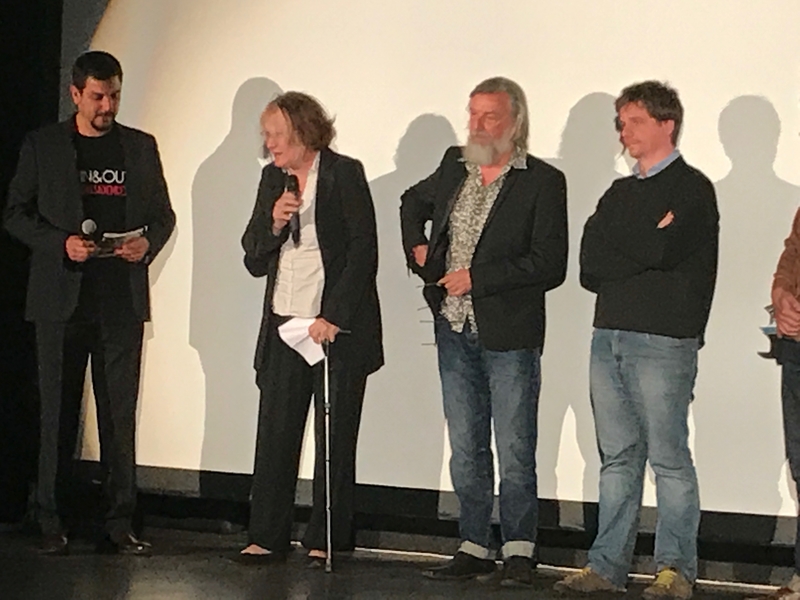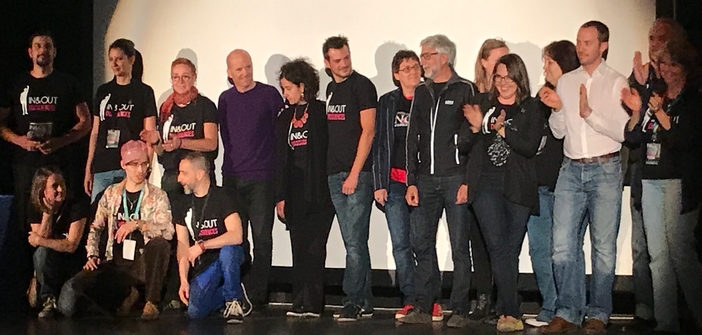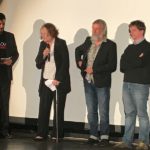The KLM Audience Award goes to Cerveaux Mouillés d’Orage by Karine Lehmon, with the best documentary being the Vietnamese Finding Phong.
Surprise in the prize list of the 9th In&Out LGBT Cinema Festival, whose closing ceremony saw the Mamac auditorium full of audience.
Indeed, it is not a cinema film that wins, but a TV drama in four episodes, O Ninho, by Filipe Matzembacher and Marcio Reolon, about a young soldier who enters the ‘magic circle’ of a powerful transvestite, Marlene.
Chosen by the jury (Karine Espineira, Jean-Pierre Paringaux, Andrea Inzerillo, Jean-Gabriel Périot) among the seven feature films in competition, it seems to give a strong indication of a trend in LGBT cinema: television-made products — think of Netflix, which will have two films in competition at Cannes — which have revealed new talents from around the world.
Furthermore, it is a way to signal the vitality of South American queer cinema, one of the most vibrant: think of Lucia Puenzo, Santiago Otheguy, Pablo Trapero. But it is a shame to have ignored the visionary horror Closet Monster by Stephen Dunn with Isabella Rossellini’s voice given to the hamster Buffy.
The KLM Audience Award for Best Feature Film goes to Cerveaux Mouillés d’Orage by Karine Lehmon.
The Vietnamese documentary Finding Phong by Phuong Thao Tran and Swann Dubus-Mallet wins the ampersand for Best Documentary, and Gabber Lover by Anna Cazenave Carbet takes that of Best Short Film. The jury award goes to Pedro by André Santos and Marco Leão, and the audience award to Herculanum by Arthur Cahn.
The closing film, Taekwondo by Marco Berger, was a boring comedy without a plot about a group of boys who spend time doing nothing and talking about girls, idiocies included, in a beautiful villa with a pool. The only point of interest in the film is the bodies of the young men observed with aesthetically interesting sensuality.
One of the most beautiful titles presented at the festival was outside of competition: Jours de France by Jérome Raybaud is a strange road movie about losing oneself and loneliness. Pierre (the convincing Pascal Cervo, present at the festival) leaves his fiancé to wander across France, making encounters, sexual and non-sexual, with the mobile app Grind’r, which allows finding the nearest gays.
With a surreal tone and very successful funny situations (the magnificent virtual sex scene where the two men are separated by a wall), it speaks of the naive impulsivity of a way of experiencing gay sexuality and the sense of emptiness in a life that appears always connected to others, in which relationships are increasingly superficial.
To our provocative and political question on “the sense of fear of emptiness that crosses France these days as we wait to decide on the future,” Pascal Cervo said that “every actor is a political creature, but I don’t often speak about politics in my work.” But indeed, the slogan heard in the film effectively communicates a certain national spirit somewhat macho at this moment: “Liberty, Dignity, Virility.”
The other festival highlight was the actress Marie France, who talked about her experience as an actress for the great experimental Spanish director Adolfo Arrieta.
The documentary Mapplethorpe – Look at the Pictures by Fenton Bailey and Randy Barbato was very moving, recounting one of the greatest photographers of the twentieth century with a lot of well-selected material and a sustained rhythm.
Another surprise at the end: the festival director, Benoît Arnulf, then announced his resignation “to pursue new adventures.”
Roberto Schinardi



